Table of Contents
- Who Can Request Military Records?
- How to Replace Lost Military Service Records
- The National Archives Fire of 1973 – Some Military Records Were Permanently Destroyed
- Requesting Military Records for Historical Research
- Requesting Military Records for Persons of Exceptional Prominence
- Additional References for Historical Military Research
- Does the Military Have Photos of Me in Uniform?
- Where to Request Your Military Service Records:
- How Much Do Copies of Military Service Records Cost?
- Replacing Military Awards, Decorations, and Dog Tags
Military Service Records, medals, awards, and decorations are an important part of a veteran’s service record and are often cherished by veterans and family members. But service records are also essential to prove military service or for establishing eligibility for certain veterans benefits programs.
The most frequently requested document from the National Archives is the DD Form 214, proof of military service. This is one of the most valuable documents you will ever own, as it opens the door to a variety of benefits, such as the GI Bill, VA Loan, and possibly health care and other benefits. If you lose your DD Form 214, you should replace it immediately, since it can take some time to get a replacement.
This article will show veterans, their family members, and the general public how to request a copy of military service records, including DD Form 214, medical records, or other service records you may wish to obtain a copy of. Please click the following link if you are seeking information on replacing lost medals, awards, or decorations.
Who Can Request Military Records?
The government does not release full military service information to everyone who requests it. If the service member is still alive, he or she is the only person who can request the Complete service records, unless the veteran has given written permission to another individual, or the records are needed as part of a court order.
If the veteran is deceased, the full military service records may be requested by Next-of-Kin (NOK). If you are not the veteran or NOK (as defined below), then you are considered to be part of the general public. Members of the general public may request limited service records through the Freedom of Information Act (FOIA).
In some cases, full military records are released for Persons of Exceptional Prominence. These are usually veterans who are in the public eye due to their military or post-military careers. Almost anyone can request military records for these veterans (more information on this below).
Next of Kin Military Records Requests
Let’s take a look at who the government considers being Next-of-Kin, and who the government considers being the general public (remember, these limitations are in place to protect your privacy).
According to the National Personnel Records Center (NPRC), Next-of-Kin includes:
- For the Air Force, Navy, Marine Corps & Coast Guard, the NOK is defined as: the un-remarried widow or widower, son, daughter, father, mother, brother or sister.
- For the Army, the NOK is defined as: the surviving spouse, eldest child, father or mother, eldest sibling, or eldest grandchild.
- If you do not meet the definition of NOK, you are considered a member of the general public.
How to Replace Lost Military Service Records
Because the National Archives houses service records for millions of military veterans, you will need to provide them with some information to help locate your service records. If you are the veteran, most of this information shouldn’t be too difficult to come up with.
It’s also important to note that the National Archives processes over 1.4 million records requests annually, so to streamline the process, they generally only provide veterans and family members with a copy of the separation documents or DD Form 214, which are required for most veterans benefits. If you need additional military service records or your medical records, you must specify this when you make your records request.
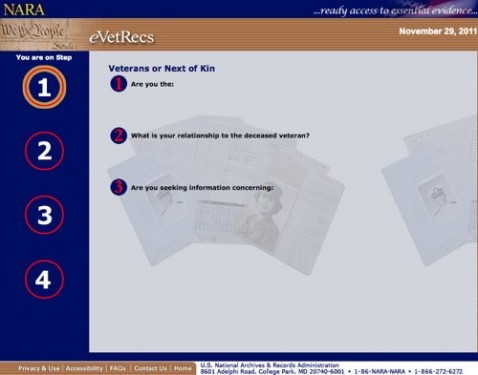
To request your service records, you will need to make an online request via the eVetRecs System or by sending in a signed and dated copy of the SF 180, Request Pertaining To Military Records which you can download from the National Archives site, of from https://www.va.gov/vaforms/.
Here is a list of the basic information you will need:
- The veteran’s complete name used while in service
- Service number
- Social security number
- Branch of service
- Dates of service
- Date and place of birth (especially if the service number is not known).
- All requests must be signed and dated by the veteran or next-of-kin.
- If you are the next of kin of a deceased veteran, you must provide proof of death of the veteran such as a copy of the death certificate, a letter from the funeral home, or a published obituary.
It is also helpful to include additional information when making your request, such as the reason for your request (if you need additional documents) or a deadline if applicable – this can be common when applying for benefits such as a VA Loan, military burial benefits, Aid & Attendance Benefits, or other benefits which may have a deadline. (The National Archives tries to process “emergency” requests within two business days, so try to be prepared when sending in your records request).
The National Archives Fire of 1973 – Some Military Records Were Permanently Destroyed
The National Archives experienced a massive fire in 1973 which damaged or destroyed service records for 16-18 million Army and Air Force veterans who were discharged between 1912-1964. In some cases the service records can be reconstructed from alternate sources such as base or unit level records, though in some cases, some records are completely destroyed. Records that fall into this category can take several weeks or longer to research and complete. You can read more about this incident and the efforts of those at the National Archives to reconstruct the records in this article.
Requesting Military Records for Historical Research
Individual military records are generally private and restricted to the member or next of kin. However, some military records are made public. These can include general information for various campaigns, casualty records, various statistics, records of medals, awards, and decorations, certain combat operations, records of POWs and MIAs, select photo archives, and much more.
Most of the information in these reports is aggregated information that would be useful to researchers, authors, and those with a historical interest in military operations. Here is a link to the data and information that can be found online. Other information is held in the archives and is available to historical researchers. Note that some of this information has not yet been transferred to a digital medium and is only available through archival research.
Requesting Military Records for Persons of Exceptional Prominence
Many military veterans have gone on to lead prominent lives. In these cases, the National Archives will often make these records available to researchers. These may include famous veterans such as military heroes, Presidents and other politicians, sports stars, celebrities, businessmen and women, cultural figures, entertainers, and more. These records may be available upon request. Note: there may be an associated fee. More info.
Additional References for Historical Military Research
These resources may also be helpful:
- Online Veterans and Military Documents (digital archives for Current Era Operations, Vietnam War, Korean War, WWII, WWI, Spanish-American War, Civil War, and Revolutionary War).
- Genealogy and Military Records.
- Documents and Photos.
- National Archives Catalog.
- Other Military Research Links.
Does the Military Have Photos of Me in Uniform?
That is a great question, and I’m not sure. The military does maintain some of these records, but not all of them. My photo was taken with my Basic Training Flight, and that should be part of the Air Force historical records. I probably had my photo taken in uniform when I was in Basic Training, but I honestly don’t remember. If I did, then it may be part of my historical records if it was an official photo. But if the photo was taken by a commercial photographer, then it likely isn’t stored in any government archives.
I know my Officer Training School photos fall into this latter category. The photos were taken by a contractor that had the contract to take photos of our flights and us as individuals. We had the opportunity to buy either photo in hard copy or digital format. But this was a contract between us and the company. These were not official military photos, so they will not be a part of our official military archive.
Whether or not your photo is kept by the military will largely depend on when and where you served, whether or not you had official photos taken, and the policies of the individual branch of service at the time the photo was taken.
I wish I could tell you everyone has an official photo on file, but I doubt that is the case. I recommend contacting the National Archives or your branch of service’s records department to see if they have any official photos of you in uniform.
Where to Request Your Military Service Records:
Military records are maintained at the National Archives in St. Louis, MO. You can request a copy of your records online, or by mail or fax. Be sure to sign and date your request.
NPRC Mailing Address and contact info:
National Personnel Records Center
Military Personnel Records
1 Archives Drive
St. Louis, MO 63138
NPRC Phone Number:314-801-0800
NPRC Fax Number: 314-801-9195
How Much Do Copies of Military Service Records Cost?
In general, a request for basic service and medical records is free for service members and next of kin, provided the request is for a non-archival service record. Military service records are considered to be archived 62 years after the service member separates from the military. Requests for a copy of an Official Military Personnel File that is archived will be assessed a copying fee, which is $20 for a 5 page document, or a flat $60 fee for files that are more than 5 pages.
Replacing Military Awards, Decorations, and Dog Tags
Many veterans who are seeking copies of their military records may also want to look into replacing lost or damaged military awards & decorations, or their old dog tags. Each of these has a different process, which is explained in the following articles:
- How to Replace Lost Military Medals, Awards, and Decorations.
- Replacement Dog Tags – Where to Get Them, and What You Need to Know Before Buying.
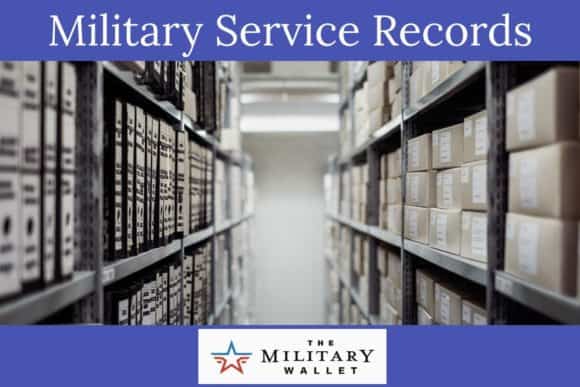
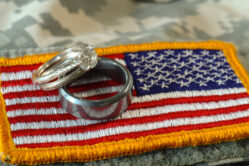
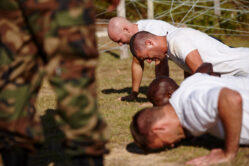
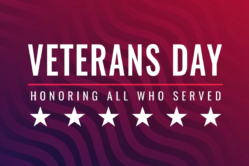
Comments:
About the comments on this site:
These responses are not provided or commissioned by the bank advertiser. Responses have not been reviewed, approved or otherwise endorsed by the bank advertiser. It is not the bank advertiser’s responsibility to ensure all posts and/or questions are answered.
edwin lewis says
where do i get my service number from i cant findit
Tina Young says
How can I get a copy of my dd214
David Wolfe says
I and several friends are having issues with the VA – specifically loans. All are reserve Army.
In my case the VA could not find me – after two years of research and going through many offices the VA finally said they agreed I was in from Aug 1966 to Dec 1970 and was given an Honorable Discharge in Aug 1971 – but – say I did not serve my full six years. Told me to contact FAS. They said they only had pay records from 1972 forward and had no idea how to find the 1971 pay stubs?????
Suggestions?
Jeffrey says
Hello. I have a question. If a veteran applies for a civil service job, can the employer obtain military records such as medical records for the purposes of determining if the veteran should be hired for the specific job?
Ryan Guina says
Hello Jeffrey, In general, your medical records are not public information and should not be viewed or obtained without your permission. However, there may be some instances in which the job requires certain medical qualifications (such as federal law enforcement, or something similar). The government may be able to view certain records if you grant them permission, or if the application states you are aware they may request or obtain certain records. You should contact the human resources office and/or a lawyer if you believe your medical records were obtained without your permission.
Cynthia says
Hello,
My question is in regards to photos of a veteran, who lost all of his memorabilia over the years w/multiple moves. He served in both the Navy & the Marines from 1987-1996. Most importantly, I just want to know how to go about getting his Marine Boot Camp Graduation picture. I know the month & yr of his graduation but not the actual date nor his platoon #. Where should I begin? Would like to give as Christmas gift this year. Thanks for any assistance you can give.
Ryan Guina says
Hello Cynthia, Thank you for contacting me. I’m not sure where these records would be maintained, or if there is a way to find them. I recommend contacting either the National Archives, or the Marine Corps personnel office. They would be the best points of contact in your research. Best wishes!
Cynthia says
Thank you, Ryan.